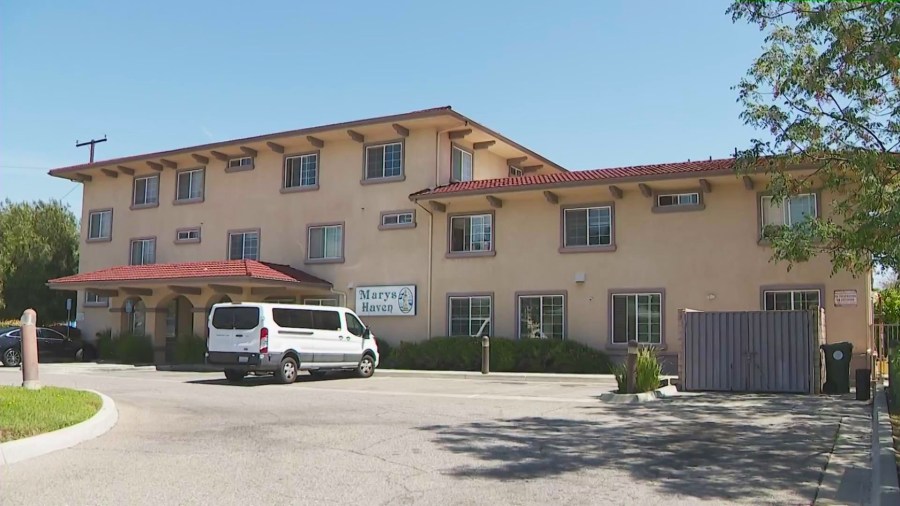
Southern California shelters, which serve women facing domestic violence and substance abuse, may have closed their doors after federal funds that the shelter relied on have been cancelled.
San Bernardino’s Mary’s Mercy Center offers a range of support services, including food, clothing, support services and transitional living facilities for displaced people, women and children.
“I knew I had to leave myself for my safety, for my child and for me,” she said, not wanting to be identified.
Barbara Bennett, a mother of four, sought help from Mary’s shelter after suffering from substance abuse. (KTLA) The mother of three children (who didn’t want to be identified) sought help from Mary’s shelter after she and her children suffered from years of domestic violence and abuse from her ex-husband. (KTLA) Mary’s Haven is a program at the Mary’s Mercy Center in San Bernardino, providing shelter and services to displaced women with young children who often face problems with domestic violence and substance abuse. (KTLA) Mary’s Haven is a program at the Mary’s Mercy Center in San Bernardino, providing shelter and services to displaced women with young children who often face problems with domestic violence and substance abuse. (KTLA) Mary’s Mercy Center received a letter informing them that the federal funds they relied on had been cut off and the shelter was at risk. (KTLA) Mothers and children are seen at Mary’s Haven, a program at the Mary’s Mercy Center in San Bernardino. The Mary Center in San Bernardino provides shelter and services to displaced women with young children who often face problems with domestic violence and substance abuse. The family was blurred for privacy. (KTLA)
The woman said she and her three children endured both verbal and physical abuse at the hands of her ex-husband.
“I knew I needed to do something because it was happening in front of them and where they were being attacked and ignored, my kids were my number one priority,” she told KTLA’s Shelby Nelson. “I realized something was wrong with my stay over the years and asked God to help me.”
After enduring the abuse for eight years, she found the power to leave and was accepted by Mary’s Haven. Mary’s Haven is a program that provides shelter to women with young children.
“A lot of the women who come here come from extremely difficult circumstances,” explained Dunflowers, executive director of Mary’s Mercy Center. “They are survivors of domestic violence.”
For Barbara Bennett, the mother of four, she struggled with substance abuse.
“After my relationship with my son’s father, I remained on drugs for six years in a row,” Bennett said.
After being convicted and served in prison, she said it was a wake-up call she needed to turn her life around. She and her children live in Mary’s Haven as Bennett works to rebuild her life and provide stability to her children.
“They live here full time, so we provide housing for all moms and kids,” Flores said. “We provide essentials from clothing to bedding and food, as well as wraparound services such as children’s counseling, support services, treatment and kindergarten.”
However, as of April 1, Flores said he had been notified via email that funds received from the federal government would be retroactively blocked from March 24th.
Flores said the grant cutoff arrived three months earlier than planned, with 10 mothers of 24 children being housed in the facility, many of whom have no other place to go, making the facility an important binding.
“A lot of us in the nonprofit sector look at what happens at the federal level and wonder if these grants will be available next year,” Flores said.
For a woman who said she was stuck in survival mode for a long time, Mary’s Mercy Center gave invaluable support, including work and financial training, and gave her a second chance to rebuild and improve their lives.
“I’ve graduated from high school here since I went,” Bennett said. “I’m at university now.”
“It’s not just scary that we’re losing our homes and in a stable place for our children,” the unidentified mother said. “For many of our women and mothers, this was necessary.”
Flores said they are in a hurry to find solutions to find resources they can receive to bridge the funding gap.
Source link




